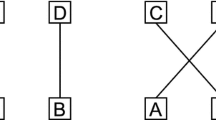Abstract
I offer a formal ontological theory where the basic building blocks of the world are timeless events. The composition of events results in processes. Spacetime emerges as the system of all events. Things are construed as bundles of processes. I maintain that such a view is in accord with General Relativity and offers interesting prospects for the foundations of classical and quantum gravity.

Similar content being viewed by others
Notes
See also Aristotle: “[Plato] as a young man became familiar with Cratylus and the Heraclitean doctrines that all sensible things are always flowing (undergoing Heraclitean flux)” DK 65A3 (The notation refers to the doxography in H. Diels and W. Kranz, Die Fragmente der Vorsokratiker, 6th ed., Berlin, 1951.)
If a weaker structure such as a causal ordering is imposed, then the ordering will be only partial, and we would be unable to accomodate space-like events in the theory. So I adopt a strong structure for the whole World, and then I shall show how local time can emerge from a partial ordering of time-like events.
For Euclidean spaces it is also the case that d(e 1, e 2) ≥0.
I use the word “atomic” in the original Greek sense of \(\acute {\alpha }\tau o\mu o\sigma \), “uncut”, “individual”, “not decomposable”. It should be considered as synonimous of “basic”, introduced in D 2.
Lorentz invariance is incompatible with most approaches to quantum gravity and with ontologies based on things, since in a Lorentzian world it is impossible to have an absolute minimum length.
I notice that a thing-based ontology, such as Bunge’s, is an emergent ontology of the system here presented, valid for any level well above the Planck scale.
Levels are define by space-like classes of events.
References
Bombelli, L., Lee, J., Meyer, D., & Sorkin, R. D. (1987). Spacetime as a causal set. Physical Reviews Letters, 59, 521–524.
Brand, M. (1977). Identity conditions for events. American Philosophical Quarterly, 14, 329–337.
Bunge, M. (1966). On null individuals. The Journal of Philosophy, 63, 776–778.
Bunge, M. (1967). Foundations of physics. New York: Springer-Verlag.
Bunge, M. (1974). Semantics i: Sense and reference. Dordrecht: Kluwer.
Bunge, M. (1974). Semantics II: meaning and interpretation. Dordrecht: Kluwer.
Bunge, M. (1977). Ontology i: The furniture of the world. Dordrecht: Kluwer.
Bunge, M. (1979). Causality and modern science. New York: Dover.
Bunge, M. (2003). Emergence and convergence. Toronto: University of Toronto Press.
Carnap, R. (1958). Introduction to Symbolic Logic and its Applications. New York: Dover.
Covarrubias, G. M. (1993). An axiomatization of general relativity. International Journal of Theoretical Physics, 32, 2135–2154.
Davidson, D. (1980). Essays on actions and events. Oxford: Oxford University Press.
Dowker, F. (2013). Introduction to causal sets and their phenomenology. General Relativity and Gravitation, 45, 1651–1667.
Grünbaum, A. (1973). Philosophical problems of space and time, 2nd ed. Dordrecht: Reidel.
Hawking, S. W., & Ellis, G. F. R. (1973). The large scale structure of Space-Time. Cambridge: Cambridge University Press.
Heller, M. (1990). The ontology of physical objects. Cambridge: Cambridge University Press.
Hoefer, C. (1996). The metaphysics of spacetime substantivalism. The Journal of Philosophy, 93, 5–27.
Joshi, P. S. (1993). Global aspects in gravitation and cosmology. Oxford: Oxford Clarendon Press.
Kim, J. (1973). Causation, nomic subsumption, and the concept of event. Journal of Philosophy, 70, 217–236.
Leonard, H. (1940). Goodman, N. The calculus of individuals and its uses. Journal of Symbolic Logic, 5, 45–55.
Lindenbaum, A. (1926). Contributions à l’étude de l’espace metrique. Fundamenta Mathematicae, 8, 209–222.
Lombard, L. B. (1986). Events. London: Routledge and Kegan Paul.
Malament, D. (1977). The class of continuous timelike curves determines the topology of spacetime. Journal of Mathematical Physics, 18, 1399–1404.
Martin, R. M. (1969). Belief, existence and meaning. New York: New York University Press.
Martin, R. M. (1978). Events, reference and logic form. Washington D.C.: The Catholic University of America Press.
Perez Bergliaffa, S.E., Romero, G. E., & Vucetich, H. (1998). Toward an axiomatic pregeometry of space-time. International Journal of Theoretical Physics, 37, 2281–2298.
Quine, W. V. O. (1960). Word and Object. Cambridge: Mass MIT Press.
Reichenbach, H. (1980). Elements of symbolic logic. New York: Dover.
Rescher, N. (1996). Process metaphysics. New York: State University of New York Press.
Rideout, D.P., & Sorkin, R.D. (2000). A classical sequential growth dynamics for causal sets. Physical Review D 6, id, 024002.
Romero, G.E. (2012). Parmenides reloaded. Foundations of Science, 17, 291–299.
Romero, G.E. (2013). From change to spacetime: an Eleatic journey. Foundations of Science, 18, 139–148.
Romero, G.E. (2016). On the ontology of spacetime: Substantialism, relationism, eternalism, and emergence. Foundations of Science, in press. doi:10.1007/s10699-015-9476-1.
Romero, G.E., & Pérez, D (2012). New remarks on the Cosmological Argument. International Journal for Philosophy of Religion, 72, 103–113.
Russell, B. (1914). Our knowledge of the external world. London: Allen and Unwin.
Russell, B. (1927). The analysis of matter. Kegan Paul, Trench, Trubner: London.
Sorkin, R. D. (1990) In Cianci, R., Ritis, R., Francaviglia, M., Marmo, G., Rubano, C., & Scudellaro, P. (Eds.), First steps with causal sets, 2nd eds, (pp. 68–90). Singapore: World Scientific.
Ulfbeck, O., & Bohr, A (2001). Genuine fortuitousness. Where did that click come from?. Foundations of Physics, 31(5), 757–774.
Walden, P. (2010). Causal Sets: Quantum gravity from a fundamentally discrete spacetime. Journal of Physics Conference Series, 222(012053).
Whitehead, A.N. (1920). The Concept Of Nature. Cambridge: Cambridge University Press (1920); reissued Mineola, NY: Dover Publications Inc (2004).
Whitehead, A. N. (1929). Process and reality. New york: Macmillan. Repr. 1969.
Ziloli, U. (2013). The cyrenaics. Durham: Acumen Pub Ltd.
Acknowledgments
I am very grateful to Gabriela Vila for help with Figure 1. I thank Mario Bunge, Daniela Pérez, Janou Glaeser and Federico López-Armengol for stimulating discussions and comments.
Author information
Authors and Affiliations
Corresponding author
Rights and permissions
About this article
Cite this article
Romero, G.E. A Formal Ontological Theory Based on Timeless Events. Philosophia 44, 607–622 (2016). https://doi.org/10.1007/s11406-016-9697-8
Received:
Revised:
Accepted:
Published:
Issue Date:
DOI: https://doi.org/10.1007/s11406-016-9697-8



